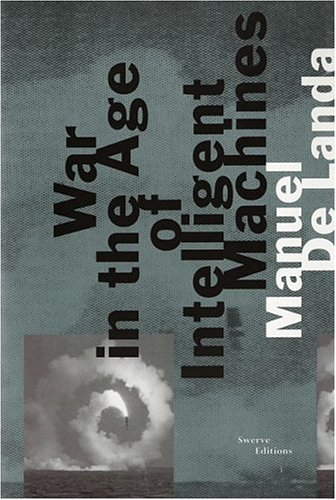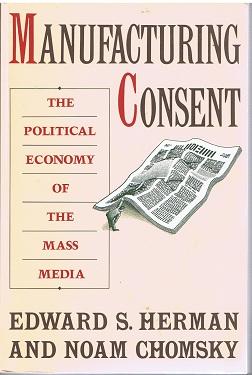Manuel DeLanda: War in the Age of Intelligent Machines (1991)
Filed under book | Tags: · abstract machine, arpanet, artificial intelligence, expert systems, machine, military, robots, technology, turing machine, war

“In the aftermath of the methodical destruction of Iraq during the Persian Gulf War, the power and efficiency of new computerized weapons and surveillance technology have become chillingly apparent. For Manuel De Landa, however, this new weaponry has a significance that goes far beyond military applications: he shows how it represents a profound historical shift in the relation of human beings both to machines and to information. The recent emergence of “intelligent” and autonomous bombs and missiles equipped with artificial perception and decision-making capabilities is, for De Landa, part of a much larger transfer of cognitive structures from humans to machines in the late twentieth century.
In this remarkable book, De Landa provides a rich panorama of these astonishing developments. He details the mutating history of information analysis and machinic organization from the mobile siege artillery of the Renaissance, the clockwork armies of the Thirty Years War, the Napoleonic campaigns, and the Nazi blitzkrieg up to present-day cybernetic battle-management systems and satellite reconnaissance networks. Much more than a history of warfare, De Landa provides an unprecedented philosophical and historical reflection on the changing forms through which human bodies and materials are combined, organized, deployed, and made effective.”
Publisher Zone Books, 1991
ISBN 0942299752
271 pages
PDF (15 MB, updated on 2016-7-18)
Comment (0)Edward S. Herman, Noam Chomsky: Manufacturing Consent: The Political Economy of the Mass Media (1988/2002)
Filed under book | Tags: · mass media, political economy, politics, propaganda, war

In this pathbreaking work, now with a new introduction, Edward S. Herman and Noam Chomsky show that, contrary to the usual image of the news media as cantankerous, obstinate, and ubiquitous in their search for truth and defense of justice, in their actual practice they defend the economic, social, and political agendas of the privileged groups that dominate domestic society, the state, and the global order.
Based on a series of case studies—including the media’s dichotomous treatment of “worthy” versus “unworthy” victims, “legitimizing” and “meaningless” Third World elections, and devastating critiques of media coverage of the U.S. wars against Indochina—Herman and Chomsky draw on decades of criticism and research to propose a Propaganda Model to explain the media’s behavior and performance. Their new introduction updates the Propaganda Model and the earlier case studies, and it discusses several other applications. These include the manner in which the media covered the passage of the North American Free Trade Agreement and subsequent Mexican financial meltdown of 1994-1995, the media’s handling of the protests against the World Trade Organization, World Bank, and International Monetary Fund in 1999 and 2000, and the media’s treatment of the chemical industry and its regulation. What emerges from this work is a powerful assessment of how propagandistic the U.S. mass media are, how they systematically fail to live up to their self-image as providers of the kind of information that people need to make sense of the world, and how we can understand their function in a radically new way.
Publisher Pantheon Books, 2002
ISBN 0375714499, 9780375714498
Length 412 pages
More info (wikipedia)
More info (publisher)
More info (google books)
Herbert Marcuse: Technology, War and Fascism (1998)
Filed under book | Tags: · 1940s, critical theory, critique, fascism, technology, war

Herbert Marcuse is one of the most influential thinkers of our time. Born in Berlin, Marcuse studied philosophy with Husserl and Heidegger at the Universities of Freiburg and Berlin. Marcuse’s critical social theory ingeniously fuses phenomenology, Freudian thought and Marxist theory; and provides a solid ground for his reputation as the most crucial figure inspiring the social activism and New Left politics of the 1960s and 1970s. The largely unpublished work collected in this volume makes clear the continuing relevance of Marcuse’s thought to contemporary issues. The texts published here, dealing with concerns during the period 1942-1951, exhibit penetrating critiques of technology and analyses of the ways that modern technology produces novel forms of society and culture with new modes of social control. The material collected in Technology, War and Facism provides exemplary attempts to link theory with practice, to develop ideas that can be used to grasp and transform existing social reality.
Technology, War and Fascism is the first of six volumes of Herbert Marcuse’s Collected Papers to be edited by Douglas Kellner. Each volume is a collection of previously un-published or uncollected essays, unfinished manuscripts and letters by one of the greatest thinkers of our time.
Editor Douglas Kellner
Publisher Routledge, 1998
ISBN 0415137802, 9780415137805
278 pages
PDF (updated on 2013-6-3)
Comment (1)
